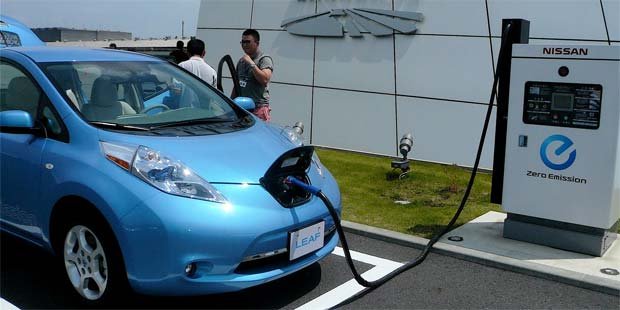British Nissan Leaf Drivers Will Be Able To Sell Spare Electricity

It's part of an ambitious trial between the automaker and Enel, an Italian multinational utility provider, to better integrate EVs to power grids.
Now, like me, you're probably wondering why the hell you'd want to sell the power from your EV's batteries. Wouldn't that just be like siphoning fuel from a gas-powered vehicle so you can sell it to some random driver? Yes... and no. Unlike gasoline, which stays at a relatively constant price during a 24-hour period, the cost of electricity fluctuates. It's why so many EVs have an option to charge during "off-peak" hours, when the grid is under less strain and juice is cheaper. The trial program would take advantage of this, selling electricity back to the grid when it's more expensive, with the end result being more consistent, affordable prices across the board.
While the trial will focus on 100 Leaf and NV200 EVs, Nissan says that if all 18,000 of its UK-based electrics were hooked up to a vehicle-to-grid system, it'd pump the equivalent of 180 megawatts back into the grid. Figures for how many homes a single megawatt can power vary – some quick Googling reveals anywhere from 600 to 1,000 to just 127 – but it's clear that an extra 180 mW is a hell of a lot of juice. And if every vehicle on UK roads were a V2G-paired EV, there'd be an extra 370 (come on, say it in your best Doc Brown voice) gigawatts dumped back into the grid. That's enough to power the UK, France, and Germany combined.
Nissan has also inked a big alliance with Eaton to sell something called the xStorage. It uses 12 "second life" Nissan Leaf batteries to store up to 4.2 kilowatt-hours of juice gathered from solar panels or during off-peak hours, saving people money during peak usage. In that way, it's like Tesla's Powerwall, but in a far more important way, it's better.
That's because xStorage can draw power from a Leaf and then sell the spare electrons back to the grid, before recharging the car during off-peak hours. Speaking to Autocar, Nissan Europe Chairman Paul Wilcox said that'd earn owners about 600 pounds (around $866 US at today's rates) in extra income. Based on that figure alone – in other words, not counting indirect savings from using the xStorage's saved power during peak usage – owners could pay off the $4,620 price of the unit in just over five years.
The V2G system will be offered to British consumers this October, while pre-orders on the xStorage system will open this September.
Nouvelles connexes


